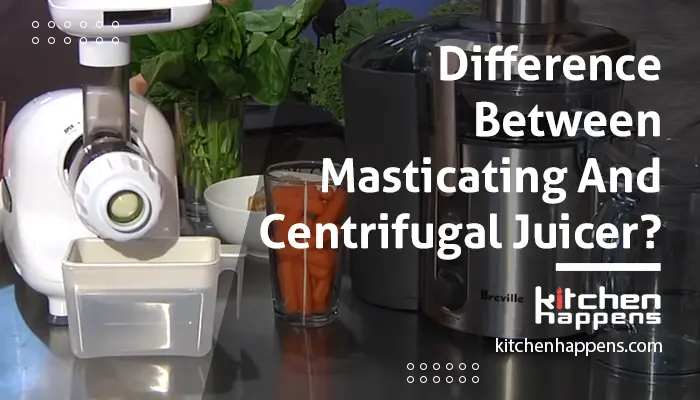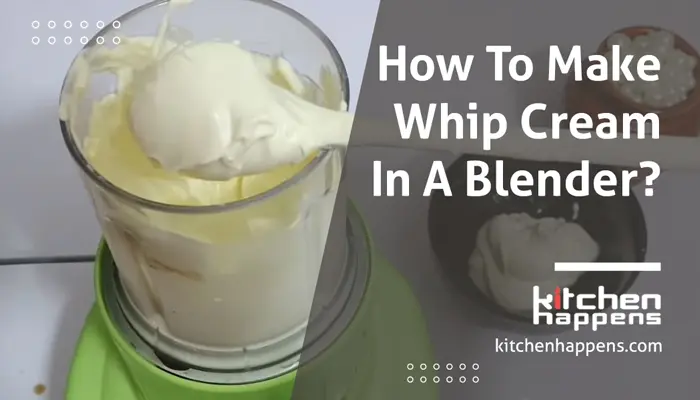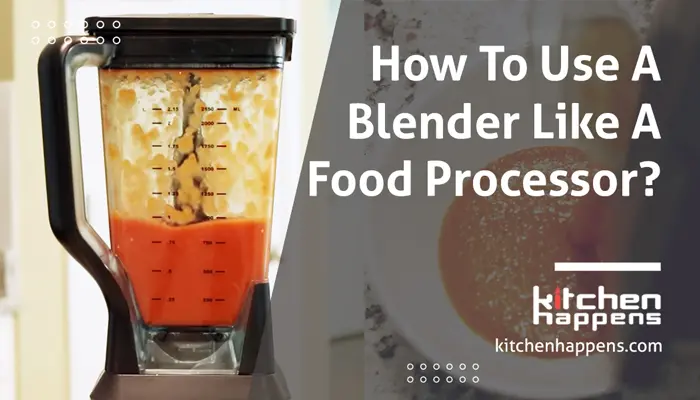A juicer is a vital kitchen appliance that allows you to make your favorite juice at home whenever you want.
Juicers come in a variety of models, as you already know. Additionally, they are available in various sizes and shapes. Masticating or centrifugal juicers are the two primary types of juicers that are currently in high demand.
Therefore, the first thing you should consider when purchasing a juicer is the type of juicer you require, which can be either a centrifugal or masticating juicer. According to their features, both models of juicers work effectively; without a doubt, you can extract juice from both of them.
However, is there truly a difference between centrifugal and masticating juicers?
The answer is thus straightforward. But, yes, these two types of juicers undoubtedly have some significant differences.
Therefore, today we are going to share a comparison guide on the difference between masticating and centrifugal juicer.
Although masticating and centrifugal juicers have unique characteristics, we will focus on each of them separately in this article. You can, however, choose the juicer that best satisfies your needs and budget limit.
Difference Between Masticating And Centrifugal Juicer
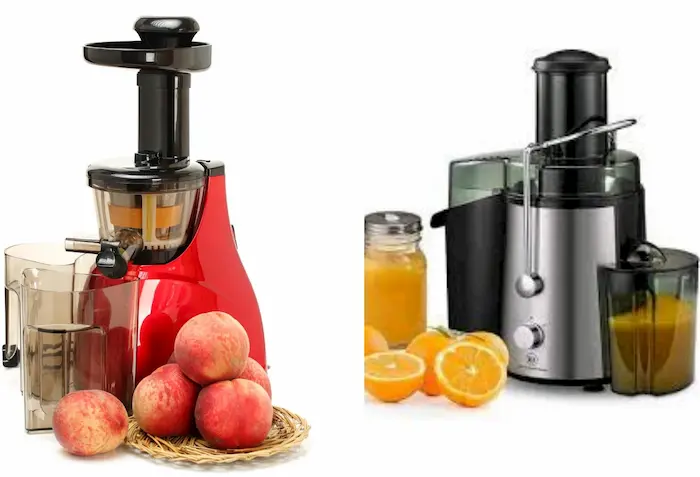
The primary goal of each of these juicers is to simply extract juice from fruits and vegetables by pressing the components against a sharp blade. Therefore, they have some differences like where there is a difference between a blender and a juicer.
While masticating juicers operate at a moderate to low speed to extract juice, centrifugal juicers do so speedily.
Both masticating and centrifugal juicers have benefits and drawbacks.
Most fruits and vegetables work well in centrifugal juicers since they are frequently less expensive and easier to find. Masticating juicers are generally more efficient and retain more nutrients but are slower and typically more costly.
If you want to make juice from fruit and vegetables at home or for your business but aren’t sure which juicer to choose, which is better: a masticating juicer or a centrifugal juicer?
Below are some details you may need to decide which type of juicer is the best for you.
Masticating Juicer
At the very first, let’s know everything you need to know about masticating juicers. Masticating juicers are also known as slow, cold press, and auger juicers.
The ingredients are first squeezed, then crushed at a slow speed of 40 to 100 RPM. Despite the lengthy extraction process, the juice produced has an exceptionally strong flavor and nutritional value.
Juicers have augers that rotate to chew and crush fruit and vegetables placed into the chute. The juice is then squeezed into a strainer, which separates the pulp from the extracted juice.
Advantages Of Masticating Juicer
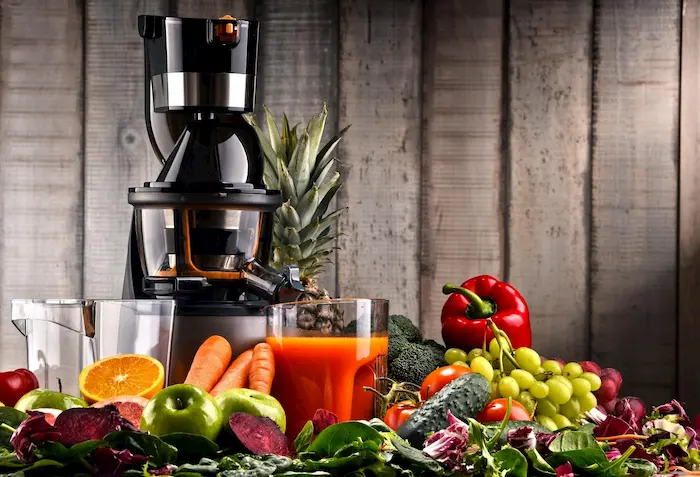
Operation is Relatively Quiet
Compared to centrifugal juicers, masticating juicers are much quieter, making them ideal for early morning use (when you don’t want to wake up your neighbors for juice preparation). In addition, they crush instead of using a spinning blade due to the friction created between two hard surfaces.
Limited Oxidation & Heat
A masticating juicer produces high-quality juice with little heat or oxidation due to its slow, steady masticating process. In this way, the nutrients and enzymes in the fruits and vegetables remain intact.
Longer-Lasting Juice
Masticating juicers produce juice that lasts for 72 hours in the refrigerator, while centrifugal juicers produce juice that loses its nutrition more quickly.
Little Foam
In general, masticating juicers produce very little foam. Foam is simply juice mixed with air bubbles. Therefore it isn’t harmful to consume it, but most people would rather not.
Disadvantage Of Masticating Juicer
Slower Juicing
There’s a reason slow juicers are called that: they are deliberately slow. Therefore, if you want juice in minutes and leave for work quickly, a cold press juicer may not be what you need.
Heavier Design
Slow juicers are typically heavier and bulkier than fast juicers, making them less portable.
More Expensive
It is expensive to own a slow juicer, but you get extra benefits. Unfortunately, these are some of the most expensive juicers on the market, costing upwards of $300.
Best For Centrifugal Juicer
- Those who have plenty of time for juicing.
- Those who are passionate about juicing and want to create the highest-quality juice.
- Juicing leafy greens is best suited for anyone who plans to juice a lot of them.
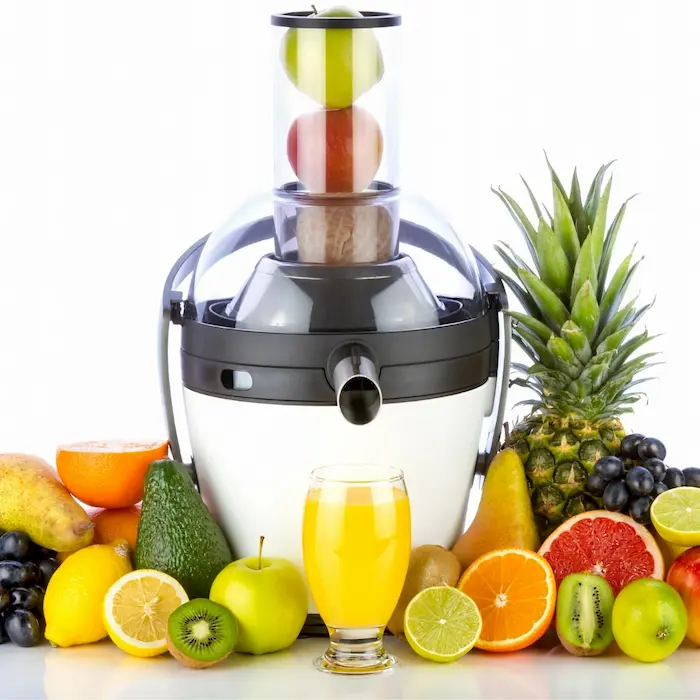
A centrifugal juicer is a fast juicer, while a Masticating juicer is a slow juicer. A spinning blade is used in the feeding tube to crush and shred the fruits and vegetables.
There is a mesh chamber in it. Centrifugal force juicers use a mesh chamber with sharp teeth for shredding fruits and vegetables into pulp.
By extracting juice at high speed, centrifugal juicers produce extracted juice faster than masticating juicers.
The juicing process takes less than 2 minutes for each glass of juice.
Benefits Of Centrifugal Juicer
Widely Available
The biggest benefit of fast juicers is that they are readily available and easy to use. If there was only one juicer for sale in a store, chances are it would be a centrifugal juicer. Due to the wide availability of this type of juicer, you have a lot of options as a customer.
User-Friendly
Since most of them are easy to handle, beginners can quickly put them together and use centrifugal juicers. Also, unlike masticating juicers, they typically don’t require five or more parts you have to assemble like a jigsaw. They are very easy to clean. Take a look on our guide on how to clean a blender.
More Affordable
Centrifugal juicers tend to be more affordable because there is more competition in the market and they produce lower-quality juice.
Quick to Use
You can whip up juice in a few minutes using a centrifugal juicer. A centrifugal juicer is a solution for you if you need to prepare something quickly before leaving the house.
Disadvantage Of Centrifugal Juicer
Noisy
It should come as no surprise that centrifugal juicers create a lot of noise due to their use of centrifugal force at high speeds. Therefore, they are not the best option for early mornings or late nights.
Poorer-Quality Options
Not all centrifugal juicers, however, are of poor quality. Due to these juicers’ cheap construction, some are not a good choice. When purchasing a product under $100, I recommend checking reviews carefully.
Not as Nutritious
A centrifugal juicer destroys enzymes by creating heat and oxidation, which destroys the juice’s quality.
Not Ideal for Leafy Greens
The fast-spinning blade can rapidly tangle leafy, sinuous vegetables in centrifugal juicers. Moreover, a fast juicer won’t give these veggies enough time to process, so they’ll be spitting out as pulp before much juice can be extracted.
Rapid Juice Oxidation
Compared to cold-pressed juice, centrifugal juice has a shorter shelf life. Oxidation can make a good juice go bad quickly. Centrifugal juicers also separate juice quickly, so the juice’s lifespan is shorter. If you want to reap the nutritional benefits of juice, you should drink it immediately.
Best For Masticating Juicer vs Centrifugal Juicer: A Detailed Comparison
- People who plan to juice for a large family or large group.
- Those who are too busy to use a masticating juicer.
- People who enjoy juicing hard fruits or vegetables.
- Anyone who is less familiar with juicing and does not want to invest in an expensive juicer.
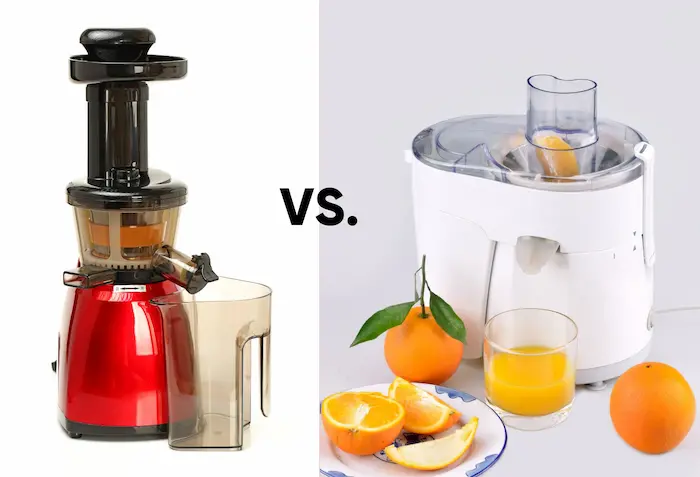
Do you know what’s the difference between masticating juicer and centrifugal juicer? If you are not, don’t worry. The following is a detailed comparison between them based on their differences.
Juicing Methods
The masticating juicer uses powerful augers to masticate or mash fruits, vegetables, and green leaves.
This juicer is considered a cold-press juicer based on its juicing process. It has a horizontal design.
As part of the juicing process, vegetables or fruits are fed into the tube at the top.
The tube tunnel squeezes and crushes the substances to extract as much juice as possible. Juice and pulp are pushed through the tube’s end and disposed of at the bottom.
Comparatively, centrifugal juicers have a vertical design. Through the top of the machine, fruit or vegetables are pushed into a mesh chamber.
As a result of the razor-sharp teeth, the substances are shredded.
By spinning rapidly around the chamber at high speed, the sharp teeth in the blades extract juice while blending.
Juice is emitted through spigots instead of a separate pulp ejection chamber with some juicers.
Performance
As far as performance is concerned, masticating juicers always beat centrifugal juicers. Masticating juicers give great results when it comes to nutrient level, juice quantity, taste, and flavor.
Juice Extraction
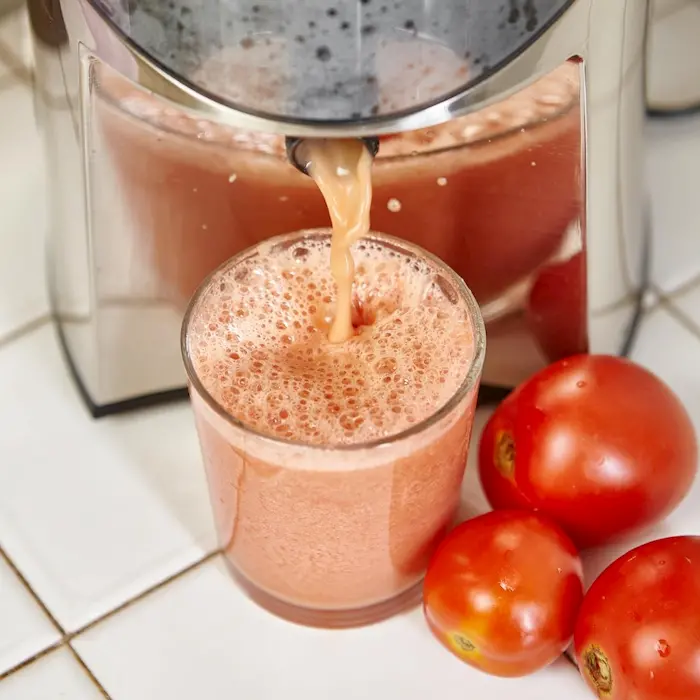
High-end masticating juicers can produce maximum juice from wheatgrass, leafy greens, fruits, and vegetables. However, this type of juicer cannot handle whole pieces of ingredients.
To get the maximum output from fruits and vegetables, they need to be cut into small pieces.
Alternatively, centrifugal juicers extract juice more quickly. It is therefore considered to be a time-saving juicer. It is therefore considered time-saving to use this type of juicer.
This appliance is capable of mashing whole pieces of fruits and vegetables quickly. It is recommended to use this juicer only for soft and hard fruits and vegetables.
Nutrient Assurance
Masticating juicers are best for health-conscious juice lovers. As a result of its cold-press juicing system, the juice maintains a high nutrient level.
Despite the slow and time-consuming juicing procedure, the juice produced is worth the high price. Additionally, the slow press system prevents foam and hit from forming.
Centrifugal juicers work by spinning at high speeds. As a result, it generates a hit. So, this juicer has a nutrient assurance debate.
Traditional juicing, however, does not produce much heat that destroys food enzymes.
Scientists believe enzymes die when exposed to 118°F. Due to the speedy rotation system, juice quickly oxidizes due to the foam created by the spinning.
Test and Flavor
A masticating juicer assures you will have a drink in the original test. As the juice is pressed slowly and cold, its taste and taste remain unchanged.
In the centrifugal juicer’s juicing method, some nutrient contamination results in oxidation, causing a small shift in the juice test.
Long Durability
A masticating juicer has a longer lifespan and is more durable than a centrifugal juicer regarding price, juicing process, and performance.
In contrast, centrifugal juicers are more cost-effective and time-efficient. However, centrifugal juicers are less durable due to their high speed.
Particularly the sharpened teeth get dull quickly for the cheapest centrifugal juicer.
Versatility and Flexible Usability
A masticating juicer is an all-in-one machine that acts as a juicer, blender, mixer, and food maker. It’s a great tool for making delicious nut butter. Even you can prepare baby food with it.
When it comes to easy use, centrifugal juicers are the best. You can use it to cut whole fruits and vegetables. As a result, you won’t have to spend extra time chopping and cutting.
Unlike masticating juicers, centrifugal juicers have a larger chamber. Therefore, it provides easy cleaning and dishwashing functionality.
Noise Versus Quiet Operation
Centrifugal juicers cause extensive noise when they work in high-speed spinning mode. In order to extract juice from substances, the grinding system produces more noise and hits.
Alternatively, masticating juicers offer a variety of operating modes. In normal juicing, the juicer does not make as much noise as a centrifugal juicer.
Price
In order to make a good buying decision, a buyer must first consider his own capabilities. It is important for him to have a budget so he can purchase a juicer that meets all of his needs.
Even though masticating juicers are more efficient than centrifugal juicers, their price range does not suit every consumer.
Despite its high price, this juicer is not actually affordable for everyone. Typically, the price range begins at $500.
In contrast, centrifugal juicers start at $40. If you are within your budget limit, I suggest buying a bit more expensive time juicer, considering the quality of the machine.
As a result of comparing the features of the Difference Between Masticating And Centrifugal Juicer, you now have a better understanding of what makes each different.
Right now you are going to know which is better masticating juicer or centrifugal juicer. So take a deep dive into the below section without any further ado.
Masticating vs Centrifugal Juicers: Which One You Should Choose?
Choosing between masticating and centrifugal juicers is a matter of personal preference. This guide on Difference Between Masticating And Centrifugal Juicer should help you make a good decision, but there may not be one solid option to choose from.
Ultimately, the type of juicer you purchase will be determined by your budget and needs. If you want to make a quick drink before work or the gym, a centrifugal juicer may be the best choice, due to its faster speeds. Additionally, they tend to be smaller and cheaper.
However, if you want to squeeze as much juice out of fruits and vegetables as possible and don’t mind the wait and the higher price, a masticating or triturating juicer can be more appropriate.
Final Words
The final decision is entirely up to you; we have covered all the details about Difference Between Masticating And Centrifugal Juicer. And if you’re still unsure, consider the juicer’s advantages. Budget, however, plays a crucial role.
As a result, the debate between centrifugal and masticating juicers will never end. Hence, you should choose a juicer that fits your needs.
Hopefully, our article on centrifugal vs masticating juicers will help you to make the right choice.
Frequently Asked Questions
How do Centrifugal and Masticating Juicers work?
Both processes extract juice from fruits and vegetables, but they do it differently. With a Masticating Juicer, you use a cork-screw style auger, while with a Centrifugal Juicer you use a round cutting blade. Compared to centrifugal juicers, masticating juicers extract more juice.
What juice can you make from these juicers?
It is very important to think about what is your preference of fruits and vegetables you want to make juice from before making a purchase. Masticating juicers can handle soft fruits and vegetables, but centrifugal juicers can handle hard fruits and vegetables.
How much juice extract do you actually need?
Juice production depends on how many people you intend to serve. Masticating juicers produce more juice than centrifugal juicers, so you may need one if you make juice for more than two people.
How long does each juice last?
In most cases, centrifugal juicers produce more foam. Therefore, separation occurs easily. As a result, the juice needs to be consumed as soon as possible, or you can store it in the refrigerator for just about 8 hours before it deteriorates.
By contrast, masticating juicers produce less foamy and oxidized juice. In order to keep the juice fresh, it should be stored in the refrigerator and consumed within 72 hours.
Which one is easy to clean: Masticating vs Centrifugal juicer?
Cleaning time will vary depending on what parts each juicer has; the more parts, the longer the cleaning time.
A masticating juicer has more components. Because of this, it typically takes longer to clean than a centrifugal juicer, which is simpler to clean due to having fewer parts.
Additionally, if you want a simple juicer to clean, use a centrifugal juicer since some of its parts are dishwasher-safe.

